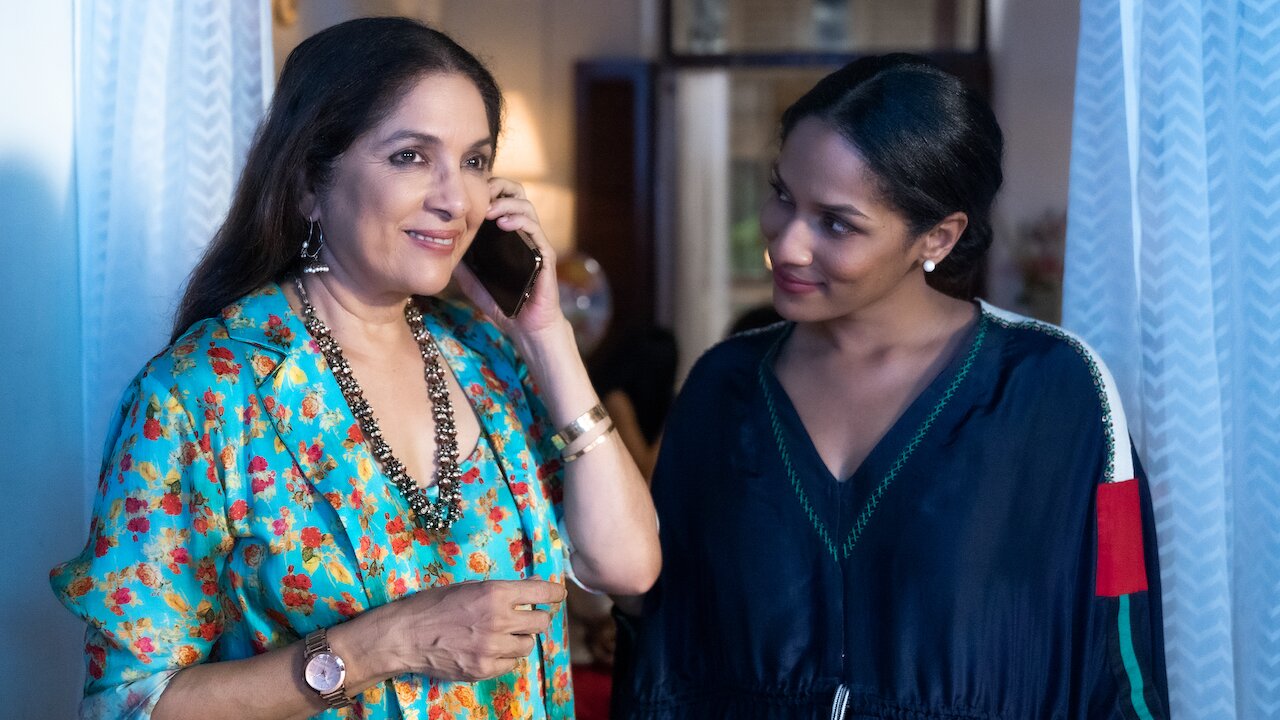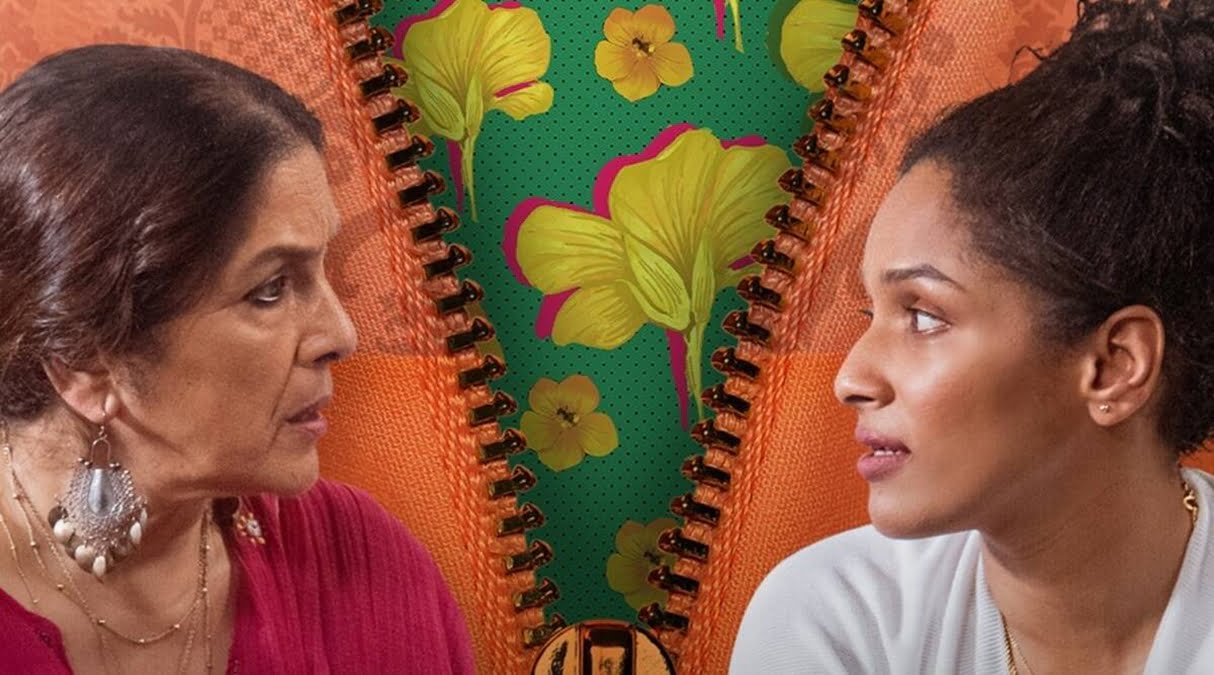Released on August 28, 2020, the show Masaba Masaba had first caught my attention when I had watched a snippet of its trailer. The young fashion designer (and an evidently fantastic actor) Masaba Gupta was in a fabric store where the shopkeeper insists that a ‘Masaba print’ is an imported fabric from somewhere in Africa. As someone who has been keenly following the trajectory of Masaba Gupta’s career, I was intrigued. Although, I must admit, I was quite confused at first at whether the show was a biopic, a docu-series or fictional content. The trailer did not make it very clear. Yet, barely a few minutes into the show and these questions were the last thing on my mind as the super talented, unconventional yet relatable mother-daughter duo Neena ji and Masaba gave us a glimpse into their lives in this pleasantly refreshing series.
The super talented, unconventional yet relatable mother-daughter duo Neena ji and Masaba gave us a glimpse into their lives in this pleasantly refreshing series.
Also read: ‘Badhaai Ho’ Starts An Important Conversation About Old People Sex
If one has to compare, one can put Masaba Masaba into the same genre as the Matt Le Blanc starrer Episodes, where he plays the lead with the same name who also happens to be an actor. In this sense, while such a form may be new to Indian OTT platforms, it is by no means ‘new’ in the full sense of the word.
The show revolves around fictionalised versions of mother-daughter duo, Masaba and Neena Gupta, but heavily inspired by their own lives. The show touches upon the personal journey of Masaba and Neena – the former’s divorce, the latter’s attempt to get her due respect and significant roles in the industry, for instance. Rytasha Rathore is endearing as Masaba’s best friend Jia Irani, Pooja Bedi’s character as Masaba’s life coach is an exaggeration to the T and Shibani Dandekar is quite convincing as an artist, although hers is only a very small appearance among other celebrities like Farah Khan, Malavika Mohanan, Gajraj Rao, Mithila Palkar, etc. – all of whom appear as themselves in the series. Writer-director Sonam Nair could have avoided using the stereotypical gay designer trope, yet, there are more wins in the series than flaws.
What makes Masaba Masaba really shine is that it is an excellent example of women telling women’s stories. Sonam Nair and writers Punya Arora, Nandini Gupta, and Anupama Ramachandran have the mother-daughter duo carrying themselves with effortless ease, while telling their story in a relatable way. Crises in the plot such as the one where Masaba has trouble finding a house for herself as a single woman, as well as her expression of wanting a home just for herself was instantly relatable to me as a young woman who has lived on her own for many years.
One of my favourite parts of the show was the song Aunty Kisko Bole Be? A catchy, fun song in the middle of a Netflix show (or even movie) was totally unexpected, but this song doesn’t seem forced at all and fits in perfectly with the narrative. Mithila Palkar and Neena Gupta’s dance-off is not only a fun element, but it also helps to make a larger point about older women and how they are looked at in society. While the video is essentially a dance-off between two women of different age groups, it effectively addresses the problem with a society that doesn’t allow women to express themselves or their sexualities by typecasting them as ‘aunties’. Although the song does have Neena Gupta mouthing the lyrics to say how older women are better than the women of today who cover their faces with makeup and filters, the fact that the entire song is shot with a hint of humour makes it comes out as more of an exposition of the way society pits women against women.
While the show revels in the idea of a ‘hot mess’ (which is incidentally the theme for Gupta’s latest line in the show and otherwise) and how that necessarily isn’t a bad thing, the show itself is far from being a mess itself.

The show highlights how both Neena and Masaba started off again: the former who continued to strive for significant roles in cinema and Masaba, as a woman in her thirties, navigating life after her divorce. In a country where women are pressured to not step out of stereotypical moulds, both Neena and Masaba are shown making brave choices. While the mother continues to stay in Mumbai, away from her husband, so she could be available for opportunities in good cinema, Masaba stops pretending to be in a happy marriage and does not give up after the launch show of her new collection fails to impress.
Although the penultimate episode involves a chaotic cruise with seasick models and falling pieces of the ramp, making it reminiscent of contrived Bollywood comic endings, the story redeems itself with the ending where Masaba and a younger version of herself come together at the end of a busy season in the world of fashion. Masaba Masaba wears its message loud and clear: It is never too late to start over (and unlike what they say, it need not always involve a guy).
Masaba Masaba wears its message loud and clear: It is never too late to start over (and unlike what they say, it need not always involve a guy).
Also read: A Curly Haired Conundrum: Parvathy & Natural Hair In Malayalam Cinema

And did we mention how wonderfully cast and absolutely adorable we found little Masaba?
Toonika is a millennial intersectional feminist. She works as an editor and audiobooks producer who also likes to write. Her pieces have appeared in The Quint, Youth ki Awaaz and Asiaville. You can follow her on Facebook, Twitter, and Instagram.
Featured Image Source: Indian Express




